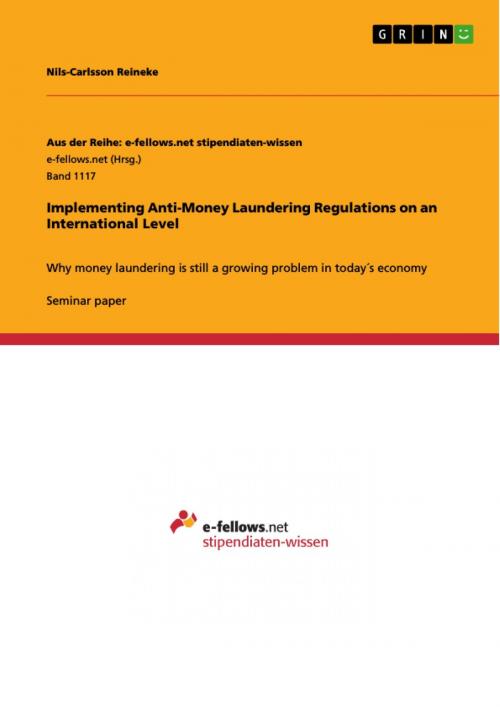Implementing Anti-Money Laundering Regulations on an International Level
Why money laundering is still a growing problem in today´s economy
Business & Finance, Accounting| Author: | Nils-Carlsson Reineke | ISBN: | 9783656897033 |
| Publisher: | GRIN Verlag | Publication: | February 13, 2015 |
| Imprint: | GRIN Verlag | Language: | English |
| Author: | Nils-Carlsson Reineke |
| ISBN: | 9783656897033 |
| Publisher: | GRIN Verlag |
| Publication: | February 13, 2015 |
| Imprint: | GRIN Verlag |
| Language: | English |
Seminar paper from the year 2013 in the subject Business economics - Accounting and Taxes, University of Glamorgan (Faculty of Business & Society), course: International Accounting and Auditing, language: English, abstract: As the IRS (2013) puts it, money laundering (ML) 'creates an underground, untaxed economy that harms our country's overall economic strength. It is a global threat that erodes our financial systems'. As the economies of the world move closer together through the much hailed and discussed process called globalization, so do the systems that undermine them. Accordingly, organized crime has been named 'the dark side of globalization' (G8, 1999). As criminals make use of the established frameworks for financial transactions on a truly global level, the lives and routines of uninvolved parties are affected from a very basic level of day-to-day activities in a local bank, over microeconomic effects to a grander scope such as the effects on the introduction of a new currency. Considering the introduction of the Euro, the possibility of profiting ML organization let some to question aspects like including a high-value bill, while others even argued against the introduction itself, fearing the benefits that ML could draw from it. The following work introduces ML, followed by a critical discussion on international anti-money laundering (AML) efforts, their implementation and the problems they face. An evaluation of the involvement of external auditors will be made, followed by a conclusion to sum up the findings and enunciate a verdict.
Seminar paper from the year 2013 in the subject Business economics - Accounting and Taxes, University of Glamorgan (Faculty of Business & Society), course: International Accounting and Auditing, language: English, abstract: As the IRS (2013) puts it, money laundering (ML) 'creates an underground, untaxed economy that harms our country's overall economic strength. It is a global threat that erodes our financial systems'. As the economies of the world move closer together through the much hailed and discussed process called globalization, so do the systems that undermine them. Accordingly, organized crime has been named 'the dark side of globalization' (G8, 1999). As criminals make use of the established frameworks for financial transactions on a truly global level, the lives and routines of uninvolved parties are affected from a very basic level of day-to-day activities in a local bank, over microeconomic effects to a grander scope such as the effects on the introduction of a new currency. Considering the introduction of the Euro, the possibility of profiting ML organization let some to question aspects like including a high-value bill, while others even argued against the introduction itself, fearing the benefits that ML could draw from it. The following work introduces ML, followed by a critical discussion on international anti-money laundering (AML) efforts, their implementation and the problems they face. An evaluation of the involvement of external auditors will be made, followed by a conclusion to sum up the findings and enunciate a verdict.















